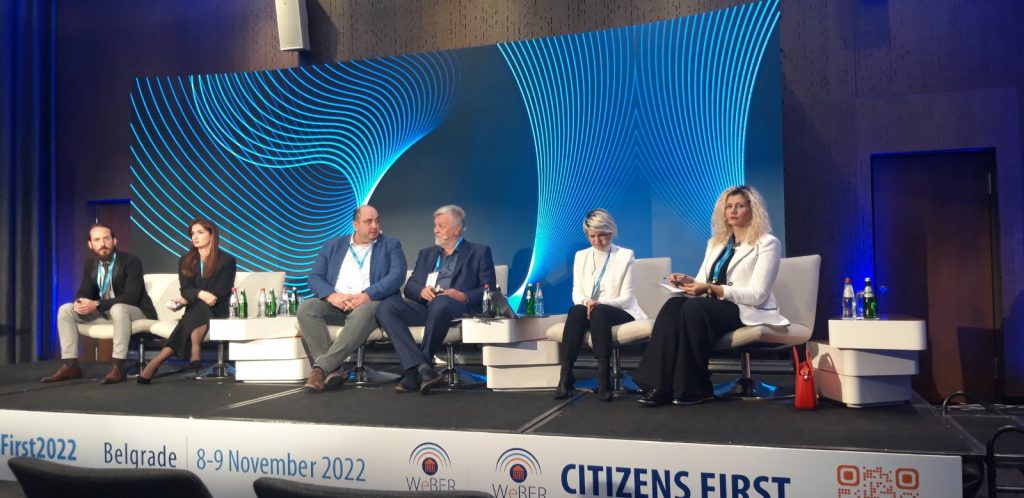
The results of WeBER research on the state of public reform in six countries of the region: BiH, Serbia, North Macedonia, Kosovo, Albania and Montenegro, which were presented at the third Regional WeBER Conference “Citizens First” held on November 8, and November 9, in Belgrade, pointed out that administrations are not transparent enough and that they need to be depoliticized and made more transparent in order to provide better services to citizens.
The conference, which was organized by the Center for European Policy (CEP) from Belgrade, aimed to improve and expand the dialogue on the creation and implementation of inclusive and transparent public administration reform policies that meet the needs of citizens.
Dragan Ćuzulan, Public Administration Reform Coordinator was a panelist on the topic “Comparison of progress/monitoring results of public administration reform in the Western Balkans 2021/2022” and spoke about the state of public administration reform in BiH, the reasons for stagnation and about the results that have been achieved.
“A positive circumstance is that the Strategy for the Reform of Public Administration 2018-2022, with the accompanying Action Plan, was extended until 2027, because its adoption alone took 2 years”, emphasized Ćuzulan and added that we are currently in the phase of implementation steps, and the key is the adoption of the Common Platform document and the Coordination Committee as a political body that should lead and direct the public administration reform process.
“The platform on joint action needs harmonization from different levels of government, and the Coordination Committee is a political body that should express a clear determination to lead the reform process,” said Ćuzulan.
As an example of irrationality, he cited the blockade of the Public Administration Reform Fund, which has been ongoing since 2017, and in which there are about BAM 10 million of available funds.
“In a situation where the local authorities do not have the necessary funds for reforms, it is completely irrational that BAM 10 million in the Public Administration Reform Fund is still blocked, even though there is a clear commitment of donors to continue financing the reforms, in accordance with the Strategic Framework and the measures defined in the Action Plan”, believes Ćuzulan and adds: “True, there is a commitment at all levels of government to unblock the Fund, but there is no agreement regarding the structure of the Coordination Committee. The reasons for the delay are not insurmountable, and I hope that this issue will be resolved soon.”
The WeBER monitoring report by individual areas for all countries of the Western Balkans indicated limited progress, but also shortcomings in the public administration reform process. Thus, it was concluded that consultations for key PAR documents are still not sufficiently open to the general public, as well as that consultations with CSOs do not take place in the early stages of adopting the document. Serbia and Montenegro are referred as a good example of that practice.
Answering this question, Ćuzulan pointed out that “at one point of time there was no agreement of all the representatives of the joint working group for the development of a strategic document to include civil society in the work of this body, but that PARCO (Public Administration Reform Coordinator’s Office) conducted subsequent consultations with civil society from who we asked specific comments and suggestions on what needs to be improved in the document. We were often left alone in this coordination mechanism to support the ideas of civil society.”
As a good example of cooperation, he cited the Policy and Standards of Proactive Transparency, which were defined in cooperation with CSOs and adopted by the Council of Ministers in BiH, as well as the mandatory proactive publication of a set of 38 information of public interest on the institutions’ websites.
“Our latest research on the proactive transparency of institutions showed that only 54% of institutions publish data on documents that are in the consultation phase on their websites,” pointed out Ćuzulan.
“Generally speaking, Bosnia and Herzegovina must amend the Law on Freedom of Access to Information, on which SIGMA gave its recommendations, but it is still pending. The key provision is the mandatory legal publication of information of public interest, i.e. budget documents, employment plans and procedures, public procurements, etc.
When it comes to the depoliticization of the public sector, Ćuzulan highlighted certain improvements in this area, although the mechanisms of political obstruction of the professional civil service are still strongly present.
“And according to the SIGMA report for 2022, there has been some progress in this area. The new Strategic Framework itself provides a good basis for civil service reform. At the level of BiH institutions, the law already guarantees the employment of civil servants based on merit, as it is foreseen by the principle of merit. Also, civil service selection commissions are free from political influence and are appointed by the Civil Service Agency. However, this is not the case at other levels yet, so in cooperation with SIGMA, intensive work is being done on the preparation of new laws that would respect meritorious employment of civil servants and prevent political influence on selection commissions. It is also planned to introduce IT tools in the recruitment process such as online testing, preventing manipulation of exam questions, evaluation based on anonymous and encrypted messages, etc. In addition, we expect that the introduction of competency assessment in the recruitment process throughout Bosnia and Herzegovina as well as the professionalization and training of selection commission members that will contribute to the selection of the best candidates and raise the overall quality of the work of the public sector”, said Ćuzulan in the panel discussion.

Vedrana Faladžić, Senior expert associate for Public Relations at PARCO, participated in the panel “Responsibility/new form of free access to information” where she spoke about reactive/proactive communication of public administration in BiH and the need to amend the Law on Freedom of Access information in BiH.
